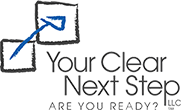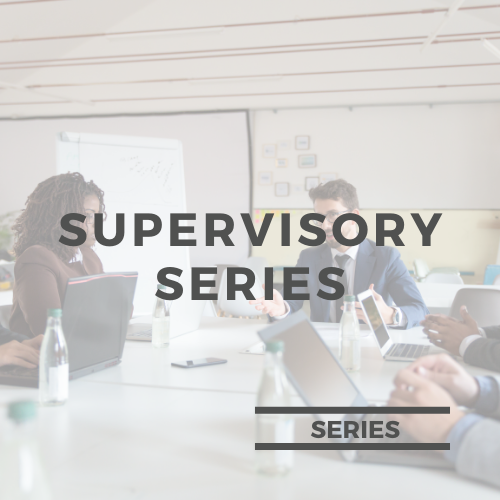Supervisory Series – Full Series
We’ll “bring” the training to you live, virtually (or live, in-person when it is safe to do so) and our highly engaging trainers will make the learning experience fun, memorable, and highly applicable.
There are a variety of people who could benefit from supervisory training such as those who are new to front‐line leadership to developing rising stars, to helping seasoned leaders stay current on current key themes in leadership. This series is designed to help all of them!
With the purchase of companion coaching, you’ll receive a coaching call between sessions to supplement your learning.
This series is built as components that can be delivered individually or assembled into half-days or full‐days of training. The series is designed to be delivered in small, consumable sessions, allowing for elapsed time and skill practice between sessions, and in which each session builds on learnings from prior sessions over time. This series includes targeted development components intended to improve the interactions front‐line leaders and other leaders have with their teams. The series includes foundations that are critical to effectively leading and directing the work of others. In many organizations, a component of completing the series includes having the supervisory series participants teach back to their own teams or to the senior leadership team what they have learned and how they are applying it for the good of the organization.
1. Foundations of Effective Communication
Highlighting critical communication tools and techniques, this session will introduce three principles of effective communication, as well as an interactive overview and application of four common communication styles, including how to recognize them, and what to do about them, specifically within the context of your organization.
- I can describe the three principles of effective communication, including what they are, and what they mean to me.
- I can recognize four common communication styles and what to do when I encounter them at work.
2. Moving at the Speed of Change
This engaging look at a framework and a common language to use when talking about change will help you look at change a little differently, with the end goal of helping you identify what kinds of changes your team will likely encounter and improving your ability to help your team through the transition process.
- I can describe the process of “change” succinctly and memorably.
- I can help myself and others through change.
3. Is Your Message Getting Through?
This module focuses on four critical steps to delivering messages effectively, beginning with knowing the purpose for the communication, the preferences of both the sender and the receiver, and the plan for ensuring that the communication transaction was complete and effective – including anticipating the likely obstacles and risks.
- I can identify the objective of communication before initiating it.
- I can prepare for obstacles that would prevent my communication from being successful.
4. Interacting Successfully with Other Human Beings
Grounded in best practices in emotional intelligence, this module focuses on techniques, approaches, and skill practices to help supervisors become more adept at adjusting their communications and interpersonal interactions with others both through planning and in‐the‐moment.
- I can recognize how my style is similar or dissimilar to another person’s.
- I can manage my own behavior, words, and nonverbals to ensure an effective exchange.
5. Making the Most of Generational Differences at Work
This module offers tactical, try‐this‐now approaches to improving the way different generations interact where you work. We’ll focus
primarily on how to recognize, appreciate, and connect with colleagues from different generations, and how to make sure we’re demonstrating communication and interpersonal styles that will resonate with others, without putting them in boxes!
- I can connect with other humans, regardless of their generational match to my own.
- I can help others engage with different generations.
6. Navigating through Tough Moments
Conflict is bound to emerge in any work environment, and this module equips participants with the tools they need to navigate through tough moments of conflict in the workplace, including focusing on making the situation safe, valuing other human beings, finding common purpose, demonstrating candor, and practicing effective communication.
- I can recognize and diffuse indicators of conflict.
- I can move conflicting individuals towards an effective resolution.
7. Giving and Receiving the Gift of Feedback
Feedback is a better gift when it comes from the heart, so how do you wrap it well? On the flipside, we don't always like the gifts we receive…but we must acknowledge them graciously. You'll have a chance to practice giving and receiving feedback well, with tools and techniques to take away.
- Learn the 5 key parts of any feedback conversation
- Explore words for delivering feedback to find what works best for you and your audience
- Practice in-the-moment feedback to improve and build on your skills
8. Making Meetings Better
Bad meetings waste time. This module focuses on making sure we don’t let our company’s precious time be sapped away by lousy meetings. Gain tools to make meetings better now, whether you’re the meeting facilitator, the meeting owner, or a “mere” participant.
- I can describe a successful framework for planning and facilitating effective meetings.
- I can apply information about meeting management to make meetings better.
9. Be "What's Missing"
This powerful module in personal and individual accountability provides a framework, based on your organization’s culture and in alignment with Gallup principles of employee engagement, of identifying what’s missing in any given situation, and then actively contributing to the success of the organization through communication, autonomy, mastery, purpose, enthusiasm, and relationships.
- I can accurately identify the missing elements of employee engagement in a given situation.
- I can add the engagement element directly or through others.
10. 10 Things Leaders Need to Consider When Working with Geographically Diverse Teams
This module focuses specifically on 10 key themes that prove important for leaders of remote teams over and over. We’ll look at the differences between how these apply at your organization, and commit to action items and follow‐up that the leaders can apply.
- I can recognize when leading a remote employee requires additional messaging.
- I can apply best practices in leading remote employees and stay consistent across different employees.
11. Building a Culture of Appreciation
This module helps leaders and influencers understand both the value of appreciation and the pragmatic reality of how to express appreciation in an authentic and organizationally effective way, based on research and a model from the work of Dr. Paul White (The 5 languages of appreciation for the workplace).
- I can recognize someone else’s language of appreciation.
- I can express appreciation to someone in a way that meets their needs.
12. Making Sure Next Year Is Even Better
This module explores a practical, tactical look at a valuable tool for you and your team to capture new learnings and
avoid having to learn the same lessons over and over. You’ll learn how to facilitate an effective retrospective to help you as a team identify and capitalize on what’s working and how to talk about and adjust those things that are not working, broken, or missing.
- I can reflect on learnings from this past year and apply them to the future.
- I can facilitate a discussion about lessons learned that help us move forward together.
13. Harnessing the Power of Your Team
This hands‐on workshop explores five characteristics of a healthy and high‐performing team and explores specific ways we can influence our teams to good health. Practical and tactical as ever, with real‐life examples and tools you can use, this session will offer insights to help you ensure your team has the five characteristics of a healthy and high‐performing team: a common goal, a healthy level of self‐awareness, a reality-based set of mutual expectations, an effective standard of communication, and at least a dose of unconditional positive regard.
- I can describe key characteristics of a healthy and productive team.
- I can positively contribute to my team’s health, regardless of my seat.
14. Leading [Insert Your Organization Name Here]
A session specialized for your organization and leadership needs.





